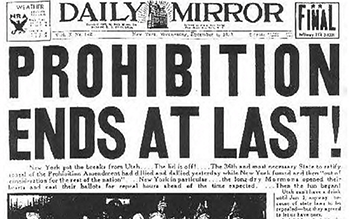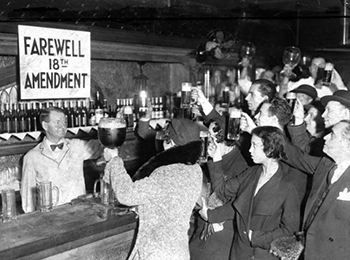December 5th sees the anniversary of the end of prohibition in the United States. We look at Repeal Day and why we don’t celebrate it like we should.
There isn’t a bartender out there who hasn’t heard of prohibition in the USA. Most would be able to tell you it started in 1919 (the famous one anyway, there were other less renowned attempts previously) and many that it ended in 1933. However, strangely the actual date of the repeal of the law, the day we should actually be celebrating, is one of the least known prohibition facts.
Old Forrester Bourbon have launched a competition to celebrate Repeal Day (details of how to enter and what the truly amazing prize is here) which inspired us to look into this historical date a little bit more.
Those amongst you with UKIP tendencies may wonder why we would care about a date in American history, the simple fact is the US has had such a huge influence on the world bar and cocktail scene it can’t be ignored. Where would we be without the plethora of amazing bourbon brands, the rise of the US craft beer movement, the amazing bars of New York and beyond, the talented bartenders and bar owners that have spread their knowledge and of course Tales of the Cocktail for those who want to spend a shed load of money getting very drunk in an exceptionally hot place.
Prohibition
Let’s do a quick recap on what preceded Repeal Day.
In the 1910’s a lot of powerful and loud people in the US blame alcohol for all the nation’s problems, namely drunkenness (hard to argue with that one), crime, mental illness and poverty, despite the fact that in the years leading up to prohibition most of these were on the decline.
In 1917, the 18th Amendment was proposed to the Senate, House of Representatives and Congress and passed through all with flying colours. It then went to the individual states for ratification – for this to happen three quarters of the (then) states had to agree to it. Less than a month after it was proposed Nebraska became the 36th of the 48 states to agree and it was passed (January 16th 1919). For the record only Connecticut and Rhode Island rejected the 18th Amendment – lads.
However, despite what you may have been led to believe, the 18th Amendment wasn’t actually the game changer, that came 10 months later (October 28th) in the form of the Volstead Act.
The 18th Amendment prohibited the production, sale and transport of ‘intoxicating liquors’ however it didn’t define what these were or what the penalties would be. That was going to be left up to the individual states to decide and enforce, which seems a little more sensible.
Then some political smartarse put forward the Volstead Act. That smartarse was a guy named Wayne Wheeler who was the founder of the Anti-Saloon League a political lobbying group in favour of prohibition (it seems that the phrase Wheeler Dealer has nothing to do with him although we suspect otherwise). This shit weasel was so up for prohibition he is rumoured to have put poison in bottles of booze and sent them out to put people off drinking, and it is claimed he once said “The person who drinks this industrial alcohol …is a deliberate suicide”.
Wheeler’s Volstead Act was the one that defined ‘intoxicating liquors’ as anything with more than 0.5% ABV, and set out the penalties. Despite the fact that the then President Woodrow Wilson vetoed the act it passed the Senate and Congress and superseded all previous state defined legislations.
Prohibition came into effect at midnight on January 10th 1920 and the first infringement of the Volstead Act was reported in Chicago on January 17th when $100,000 of medicinal whiskey was half-inched from a train.
We all know what happened after that, we’ve heard and read the stories, seen the TV shows and films and listened to bartenders bang on about it for many, many years. The end of the story is less known though.
Repeal Day
The simple fact is prohibition was a disaster. If you remember it was supposed to solve the issues of drunkenness, crime, mental illness and poverty. In 1925 journalist H.L. Mencken had this to say:
“Five years of Prohibition have had, at least, this one benign effect: they have completely disposed of all the favorite arguments of the prohibitionists. None of the great boons and usufructs that were to follow the passage of the Eighteenth Amendment has come to pass. There is not less drunkenness in the Republic, but more. There is not less crime, but more. There is not less insanity, but more. The cost of government is not smaller, but vastly greater. Respect for law has not increased, but diminished.”
The government had lost/spent millions (or billions depending on who you listen to) over the years in lost tax and policing costs which happened to coincide with the Great Depression resulting in a lot of anti-prohibition sentiment across the country.
There was another major element in the end of prohibition and it may come as a surprise to you – women. There is a misconception that all women were for prohibition, not least due to the pictures of a few sour-faced old mules that have become synonymous with the movement. In actual fact women were a driving force for the end of the era, in no small part due to their new political power thanks to the 19th amendment which gave them the vote.
So we had money men and women behind the end of prohibition, we had normal everyday folk who liked a drink in support but we still needed a political figure to spearhead the campaign. That came in the form of Franklin D. Roosevelt who based his presidential campaign in 1932 around the repeal of prohibition laws.
Unlike most politicians it didn’t take him long to actually come good on his promises and on March 22, 1933, the Cullen-Harrison Act was passed allowing the sale of beer and wine under 3.2% ABV. A fact still celebrated in the States every year on April 7th (the date the law went into effect) with National Beer Day.
The 21st Amendment was proposed to Congress on February 20th 1933 and was a repeal of the 18th Amendment. It took a bit longer for the individual states to get behind this Amendment with Michigan being the first to agree on April 10th and Utah being the deciding state on December 5th. For the record Mississippi sucks, being the last state to agree and not until 1966!
So there we have it. Like any great story it has villains – Wheeler, Temperance movement, Mississippi and Congress – and heroes – Roosevelt, Rhode Island, Connecticut and women. Plus a happy ending to boot.
Let’s Celebrate
So if we, as an industry, are so obsessed with this period – be it through our drinks, our bar designs or our love of American Whiskey – then surely we should celebrate Repeal Day with even more vigour. We propose that if you want to call yourself a Speakeasy (you probably aren’t but let’s not go down that road) then you should hold a big old shindig on December 5th. The same applies to any bars who pride themselves on their American Whiskey selection.
Ohhh and if you want to be part of American Whiskey going forward then do yourself a favour and check out the Old Forester competition here.


